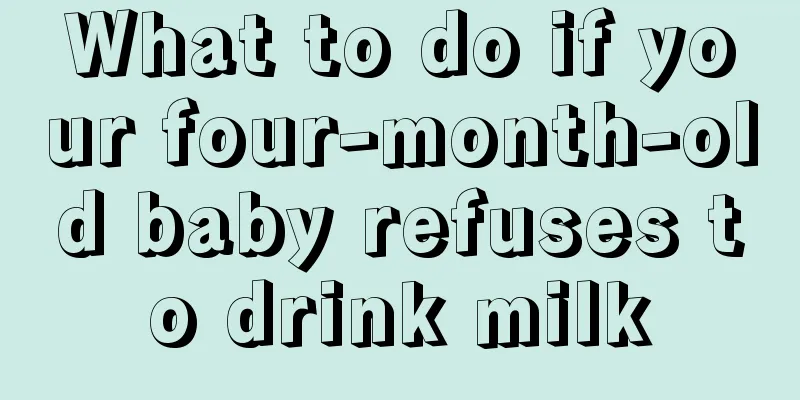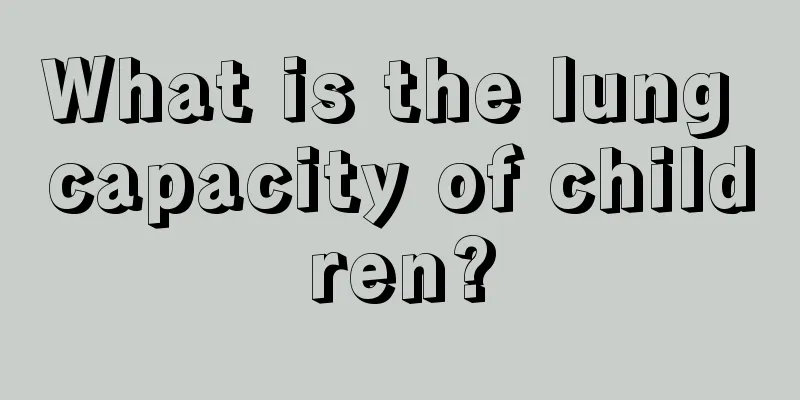What to do if your four-month-old baby refuses to drink milk

|
Many babies will experience a period of milk aversion. Generally, babies are most likely to become averse to milk when they are between 4 and 6 months old. At that time, the baby is still in the breastfeeding period and needs to rely on breastfeeding to absorb nutrients from the mother. When the baby is tired of milk, he will not drink milk and will cry a lot. When the baby refuses to drink milk, parents will become anxious and worried that the baby will get sick. In fact, it is very common for babies to refuse to drink milk, so there is no need to worry. Here I will tell you what to do if your four-month-old baby refuses to drink milk. If your four-month-old baby doesn't like to breastfeed, don't worry. You can try the following measures: 1. Do not change formula milk at will. The baby has become accustomed to the taste of the milk powder he drinks. If you change to a new variety, it is more likely to cause the baby to become disgusted and "go on a hunger strike". Generally, after the milk aversion period, babies will still like the original formula milk, so the four-month-old baby’s dislike of milk is also a transition period. 2. Do not force-feed. Anorexia may occur at different stages of a baby's development, and this is normal. If parents are anxious and force their baby to eat without waiting for his appetite to recover, he will resist and his anorexia will be aggravated. 3. If a four-month-old baby does not like to drink milk, mothers can diversify the food. If the baby starts to dislike milk, parents can work on the types and colors of complementary foods to increase the baby's acceptance of the food. 4. Provide nutritionally adequate alternatives. Temporarily eat more other food substitutes that are high in protein and calcium, such as tofu, sesame seeds, dried fish, bone soup, etc. 5. Provide your baby with a quiet eating environment and reduce external attraction or stimulation. 6. Observe the baby's growth. If the baby's growth curve is normal and his activity level is the same as before, and there are no other abnormal phenomena, such as just having a vaccination, teething, bloating, etc., the milk aversion situation will usually return to normal after a few days, and parents do not need to worry too much. If the baby still has a poor appetite and becomes less active, it is necessary to check whether he has other physiological diseases. The above is some relevant information about a four-month-old baby not drinking milk. I hope it will be helpful to everyone. When the baby is not interested in milk, prospective parents should not be anxious and should not force the baby to feed, otherwise the baby will become more resistant to breast milk. Parents can feed their babies other nutritious foods that are suitable for babies, so that the baby will not lack nutritional supplements during the milk aversion period. |
<<: Why is the newborn's voice hoarse when crying?
>>: What to do if your seven-month-old baby coughs
Recommend
What to do if your child has a fever and stuffy nose
Children's fever is accompanied by nasal cong...
What can children eat to get rid of phlegm in their throats?
I believe that many parents have encountered the ...
What are the feeding amounts for infant formula?
The amount of formula milk that babies should be ...
What are the symptoms of high blood pressure in children?
People who are overweight and elderly people are ...
What to do if your baby has diarrhea after catching a cold
In the hot summer, it seems very hot and it is im...
What are the dangers of leg pinch syndrome?
The Chinese people are still relatively conservat...
Nursing knowledge of pediatric fractures
Children are naturally curious and like to move a...
What to do if your three-month-old baby won’t sleep?
A three-month-old baby is not yet 100 days old. A...
What are the effects of pediatric undescended testicle surgery?
The cryptorchid surgery for children is actually ...
What are the dangers of children eating too much salt?
Parents must be very cautious when adding salt wh...
Is it OK for kids to eat nuts?
Many adults believe that children will easily get...
What is the standard height and weight for a 3-year-old girl?
For parents, it must be very gratifying to see th...
What to do if your one-year-old baby is thin
Babies must pay attention to nutritional suppleme...
Why do children always drool?
Why do children always drool? Moms see their chil...
What causes baby allergies?
Children's skin is the most delicate. During ...









